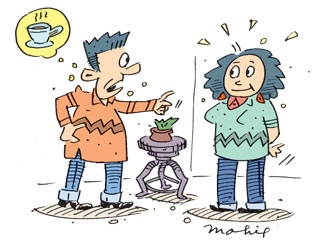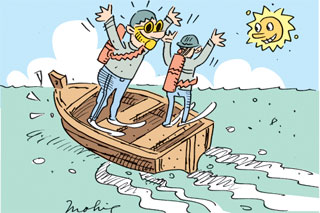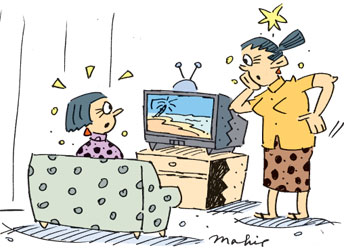|

by R. S. Karunaratne
Know when and how to use 'about'
As a preposition 'about' means 'connected with'.
Do you know something about Plato?
Doctor, I'm worried about the condition of this patient.
|

How about a cup of tea? |
Somebody is making inquires about you.
You're always talking about it.
He will talk to us about Galileo.
As an adverb 'about' is used to express time, number, and quantity.
Can we meet about 10 a.m.?
I came to reside here about 30 years ago.
The captain was about six feet tall.
The Portuguese came to Sri Lanka round about 1500.
We use 'about to' when we are on the verge of doing something.
I am about to accept the offer.
The train is about to leave.
The inspector is about to question you next.
The divers are about to jump into the see.
The plane is about to take off.
About is very common in speech.
About your house, how much do you expect?
About Neil, will he join our company?
Sometimes we use What about usually to ask questions.
What about the household expenditure?
What about Oliver? Is he fit enough to teach?
We also use how about in speech.
How about a cup of tea?
Some common nouns are followed by about.
|

The divers are about to jump into the see |
What's the argument about?
I'm going to make a complaint about his rude behaviour.
Don't you have any concern about your children?
She has no doubt about your knowledge.
Don't make a fuss about it now.
I've no idea about Gem Street.
Do you have any information about Carlo?
I've some news about your missing dog?
Have you read a story about a parrot?
He is going to talk about rebirth.
About is used after certain verbs.
We were chatting about you.
I'm going to complain about it.
I heard about your mother's death.
She knows nothing about it.
Today, we are going to learn about stars.
What are you speaking about?
Don't talk about it, now.
Do you still worry about exam results?
NOTE:
About is not used after the verb discuss.
We are going to discuss the travel arrangements tomorrow.
Students are discussing ways to improve their learning.
NOTE:
About can be used with the noun discussion.
We had a discussion about the cost of hiring.
Electric Words
Here are 10 words related to professions presented in the form of a
quiz. Check your answers with the key.
1. Dr. Smith an alienist, is annoyed with people who confuse his
title with the word 'alien'.
(a) a doctor who specialises in mental diseases
(b) a foreigner
(c) a funny person
2. Mr. Bumble in Charles Dicken's 'Oliver Twist' is the most famous
beadle in literature.
(a) police officer
(b) minor official
(c) judicial officer
3. The ageing actor consulted a cosmetologist to look beautiful.
(a) an expert in surgery
(b) an expert in space travel
(c) an expert in cosmetics
4. Shyama went to a dermatologist when she saw a sudden rash on her
legs.
(a) a person who is in charge of a clinic
(b) a doctor who does surgery
(c) a doctor who specialises in skin problems
5. An entomologist delivered a lecture on household insects.
(a) a person who destroys insects
(b) a specialist in the study of insects
(c) a doctor who treats insects
6. The police summoned a
farrier to open the bank safe.
(a) blacksmith
(b) goldsmith
(c) robber
7. Little Samadara wants to be a graphologist when she grows up.
(a) a handwriting analyst
(b) an expert in gems
(c) a maker of gramaphones
8. The lapidary washed the mud off the stone and held it against
light.
(a) miner
(b) an expert in precious stones
(c) one who digs the ground
9. An eminent opthalmologist saved her from blindness.
(a) a doctor treating skin diseases
(b) a optician
(c) an eye specialist
10. The pharyngologist discovered that the chain smoker had a mouth
cancer.
(a) doctor who specialises in diseases of the pharynx
(b) doctor who treats skin diseases
(c) doctor who treats brain diseases.
*******
[Key]
1. (a) 2. (b) 3. (c) 4. (c)
5. (b) 6. (a) 7. (a) 8. (b)
9. (c) 10. (a)
*******
Starters :
How to answer 'where'
and 'when' questions
We use 'be verbs' to form 'where' and 'when' questions
Where is Colombo?
|

When will they come to see you?
|
It is in Sri Lanka.
Where are your friends?
They are at home.
When is he coming?
He is coming next Sunday.
When are you going to India?
I am going to India on Monday.
We use 'where' to ask questions about places, directions, and
locations.
Where is Saman? (place)
He is in the classroom.
Where are you going?
(direction)
I'am going home.
Where do you stay? (location)
I stay at Nawala.
We use 'when' to ask questions about dates and time.
When is the Kandy procession?
It is on Monday.
When will they come to see you?
They will come on Sunday.
ACTIVITY
Re-arrange the words to form questions. Check your answers with the
key.
1. did - fall - Mary - over - where?
2. coming - editor - is - the - when?
3. does - her - Mrs. Herat - keep - jewellery - where?
4. morning - this - was - where - she?
5. a - buy - Tekla - car - when - will?
6. children - do - fetch - have - to - the - when - you?
7. we - are - hiding - the - money - where?
8. the - election - results - will - out - be - when?
9. Chennai - for leaving - are,- you, - when?
10. London - for - leave - Manel - did - when?
KEY
1. Where did Mary fall over?
2. When is the editor coming?
3. Where does Mrs. Herat keep her jewellery?
4. Where was she this morning?
5. When will Tekla buy a car?
6. When do you have to fetch the children?
7. Where are we hiding the money?
8. When will the election results be out?
9. When are you leaving for Chennai?
10. When did Manel leave for London? |

